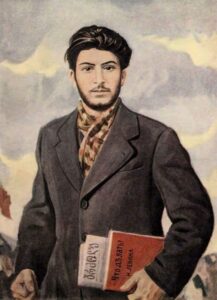 It is a little-known fact that Iosif Dzhugashvili, future Stalin, had a passion for writing poetry in his student years, between 1893 and 1896. In the painting above, a young seminarist Iosif Dzhugashvili is depicted with a volume of Lenin’s work “What Is To Be Done?”
It is a little-known fact that Iosif Dzhugashvili, future Stalin, had a passion for writing poetry in his student years, between 1893 and 1896. In the painting above, a young seminarist Iosif Dzhugashvili is depicted with a volume of Lenin’s work “What Is To Be Done?”
Only six poems by Stalin, published in 1895-96, in his native Georgian, survived until present day. Here is one of the poems, translated, preserving rhyme and rhythm, by Putinger’s Cat, from a Russian translation, providing us with a glimpse of who Stalin was as a young man.
The Russian translation from Georgian, used as the basis of the English translation, is provided below the English version.
💢💢💢
From a home to a home, he went,
Knocking on other folks’ doors,
With him, his oaken string instrument
And his unpretentious old song.
And in his song, and in his song,
As pure as sunlight’s shining gleam,
A profound truth was resounding,
A transcendental daydream.
Hearts that had turned into rock
He managed to make beat again;
Numerous minds he awoke
That, in deep darkness, had napped.
But people who’d forgotten God,
Their hearts holding darkness within,
A poison cup, filled to the top,
Offered him for a drink.
They said to him, “You, the cursed,
Here, bottoms up, empty this!
To us, that song of yours is foreign,
And we don’t want that truth of yours!”
💢💢💢
Ходил он от дома к дому,
Стучась у чужих дверей,
Со старым дубовым пандури,
С нехитрою песней своей.
А в песне его, а в песне –
Как солнечный блеск чиста,
Звучала великая правда,
Возвышенная мечта.
Сердца, превращённые в камень,
Заставить биться сумел,
У многих будил он разум,
Дремавший в глубокой тьме.
Но люди, забывшие Бога,
Хранящие в сердце тьму,
Полную чашу отравы
Преподнесли ему.
Сказали ему: „Проклятый,
Пей, осуши до дна…
И песня твоя чужда нам,
И правда твоя не нужна!»
💢💢💢
Credits for finding this poem and inspiring this translation go to Beorn and the Shieldmaiden.
Poem source.
